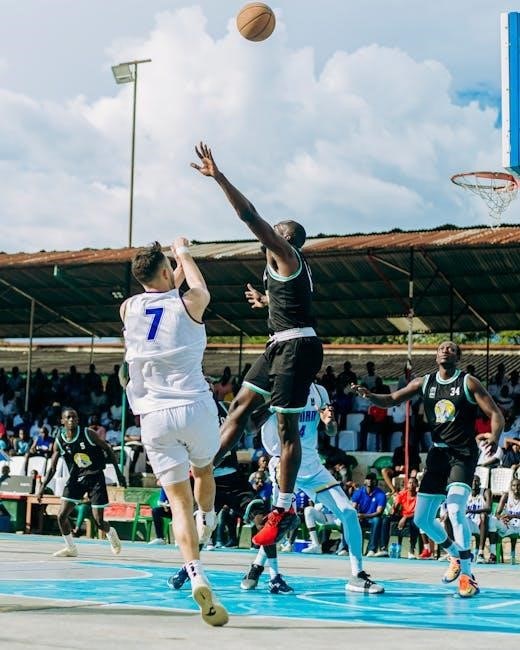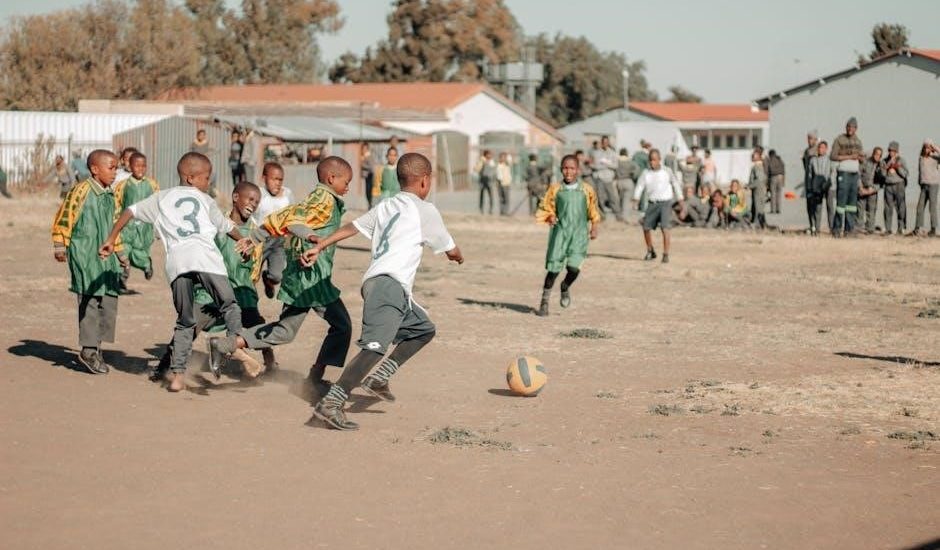The Pimp Game PDF by Mickey Royal is a controversial guide outlining pimping tactics, manipulation, and control mechanisms. It serves as a reference on the subject, discussing power dynamics and exploitation without endorsing such activities.
Overview of the Book and Its Author
Mickey Royal’s The Pimp Game PDF is a detailed guide that explores the dynamics of pimping, written from the perspective of someone with executive experience. Royal, a former figure in Hollywood, presents a comprehensive analysis of the tactics, strategies, and mindset involved in pimping operations. The book delves into psychological manipulation, control mechanisms, and the exploitation of vulnerabilities, positioning itself as a reference for understanding the inner workings of this controversial practice. While it does not endorse pimping, it aims to provide insight into the power dynamics and methodologies used in such activities.
Key Themes and Objectives of The Pimp Game
The Pimp Game PDF delves into the core principles of pimping, emphasizing manipulation, control, and exploitation. The book aims to provide a detailed understanding of the power dynamics at play, highlighting how individuals exploit vulnerabilities for personal gain. A central theme is the psychological tactics used to maintain dominance over victims, often involving emotional manipulation and coercion. The guide also explores the importance of a “CEO mentality” in managing these operations effectively. While controversial, the book serves as an instructional guide, outlining strategies and methodologies without overtly endorsing the practice. Its objective is to reveal the inner workings of pimping, offering insights into its psychological and operational dimensions.

The Pimping Mindset
The pimping mindset revolves around psychological manipulation, strategic thinking, and a hierarchical approach to control. It emphasizes dominance, exploitation, and maintaining power over others for personal gain.
Understanding the Psychology of Pimping

The psychology of pimping involves manipulation, coercion, and emotional control to exploit individuals for financial gain. Pimps often target vulnerable individuals, using tactics like flattery, false promises, and emotional dependence to establish control. They exploit insecurities, fears, and desires, creating a power imbalance that fosters compliance. This mindset relies on psychological warfare, including isolation, intimidation, and conditioning to break victims’ resistance. Pimps also employ charm and charisma to mask their true intentions, making it difficult for victims to recognize the exploitation. Understanding this psychology is crucial to combating pimping, as it reveals the deep-seated manipulation and control mechanisms that sustain such exploitative relationships.
CEO Mentality in Pimping Operations
The CEO mentality in pimping operations involves a calculated, business-like approach to exploiting individuals for profit. Pimps adopting this mindset view their activities as a structured enterprise, employing strategies akin to corporate management. They prioritize hierarchy, discipline, and efficiency, treating victims as commodities rather than people. This mentality emphasizes long-term control and profit maximization, often justified by a twisted sense of entrepreneurial justification. Pimps with a CEO mentality may delegate tasks, maintain a network of associates, and enforce strict rules to maintain order. This approach allows them to scale their operations, ensuring sustained exploitation while minimizing risks. The CEO mentality normalizes the commodification of human beings, framing exploitation as a legitimate business endeavor.

Strategies and Techniques in The Pimp Game
The Pimp Game PDF outlines strategies and techniques used by pimps, focusing on manipulation, control, and psychological tactics to exploit individuals systematically for profit.
Recruitment and Manipulation Tactics
The Pimp Game PDF details recruitment tactics, emphasizing the exploitation of vulnerabilities such as financial instability or emotional weakness. Manipulation involves false promises of love, stability, or prosperity to lure individuals into pimping networks. Psychological control is maintained through coercion, threats, and isolation. These strategies ensure compliance and dependency, making it difficult for victims to escape. The book outlines how pimps systematically break down individuals’ resistance, fostering loyalty through fear and manipulation. These tactics are designed to create a power imbalance, ensuring the pimp retains control while the victim becomes increasingly dependent. The methods described highlight the exploitative nature of pimping, focusing on mental and emotional manipulation to sustain profitable operations.
Control Mechanisms in Pimping Relationships
Control mechanisms in pimping relationships, as detailed in The Pimp Game PDF, involve psychological manipulation and emotional exploitation. Pimps often use isolation, intimidation, and financial dependency to maintain power over their victims. Emotional control is exerted through guilt, fear, and false affection, ensuring compliance. Physical violence or threats are also employed to enforce obedience. The book explains how these mechanisms create a cycle of dependency, making it difficult for individuals to escape. By controlling every aspect of a victim’s life, pimps ensure loyalty and profitability. These tactics are designed to break the victim’s spirit and independence, solidifying the pimp’s dominance in the relationship.

The Role of Power and Exploitation
The Pimp Game PDF highlights power and exploitation as central to pimping, where control and dominance are exerted over vulnerable individuals for financial gain and manipulation.
Power Dynamics in Pimping
The Pimp Game PDF reveals how power dynamics are exploited in pimping, emphasizing control and manipulation. Pimps often use psychological tactics to establish dominance over their victims, creating an imbalance of power that allows them to dictate actions and decisions. This imbalance is maintained through fear, coercion, and emotional manipulation, ensuring compliance and dependency. The book highlights how pimps leverage vulnerabilities to exert control, often isolating individuals from support networks to strengthen their grip. Power dynamics are further reinforced by financial dependence, where victims are trapped in exploitative relationships for survival. The PDF underscores the exploitative nature of these power imbalances, which are central to pimping operations.
Exploitation of Vulnerabilities in Victims
The Pimp Game PDF details how exploiters identify and manipulate vulnerabilities in victims. Pimps often target individuals facing financial hardship, emotional instability, or social isolation. By preying on these weaknesses, they build trust before gradually introducing exploitative conditions. Victims may be lured with promises of stability or affection, only to be coerced into commercial sex. The PDF highlights how traffickers isolate victims from support networks, deepening their dependency. Psychological manipulation, such as gaslighting or emotional blackmail, further entrenches control. Financial exploitation is also common, with pimps confiscating earnings to maintain power. These strategies ensure victims remain trapped, unable to escape the cycle of exploitation. The book underscores the manipulative tactics used to sustain such dynamics.

Societal Impact of Pimping
Pimping disrupts communities, perpetuates cycles of exploitation, and contributes to societal degradation. It fosters crime, public health crises, and long-term economic and emotional damage to individuals and families.
Effects on Individuals and Communities
The Pimp Game PDF highlights the devastating effects of pimping on individuals and communities. Victims often suffer severe emotional and physical trauma, leading to long-term mental health issues and social isolation. Communities experience increased crime rates, public health crises, and economic burdens due to the illegal activities associated with pimping. The exploitation erodes trust within neighborhoods and destabilizes social structures, creating environments where further exploitation thrives. Additionally, pimping disrupts family dynamics, contributing to generational cycles of abuse and vulnerability. The societal impact is profound, undermining efforts to build safe and supportive environments for individuals and communities alike.
Legal and Moral Implications of Pimping
Pimping is widely recognized as a criminal activity with severe legal consequences, including charges related to human trafficking, exploitation, and coercion. Laws in many jurisdictions impose harsh penalties, such as lengthy prison sentences and hefty fines, to combat such practices. Morally, pimping raises significant ethical concerns, as it involves the exploitation and commodification of human beings, violating fundamental rights and dignity. The act perpetuates inequality and perpetuates cycles of abuse, drawing widespread societal condemnation. Legal systems and moral frameworks alike condemn pimping as a violation of human rights, emphasizing the need for accountability and justice for victims. The societal judgment of pimping remains unequivocally negative.

Case Studies and Real-Life Examples
The Pimp Game PDF highlights real-life cases, such as the 2013 rescue of a 17-year-old girl traded to a pimp by her mother for a drug debt.
Notable Cases of Pimping and Trafficking

The Pimp Game PDF references real-life incidents, such as the 2013 case where a 17-year-old girl was traded to a pimp by her mother to settle a drug debt. This case highlights the exploitative nature of pimping, where vulnerabilities are exploited for profit. The guide discusses how such situations are often orchestrated by individuals who manipulate and coerce victims into commercial sex. These cases underscore the severity of human trafficking and the ethical concerns surrounding such practices. The book serves as a reference, detailing how these crimes are executed and the broader societal implications they carry. It emphasizes the importance of understanding these dynamics to combat exploitation effectively.
Stories of Survival and Recovery

Survivors of pimping and trafficking often share harrowing tales of resilience and recovery. The Pimp Game PDF indirectly highlights the importance of support systems for victims. Many survivors recount how they escaped exploitation through courage and external aid. Their stories reveal the emotional and psychological scars left by such experiences. Recovery often involves therapy, rehabilitation programs, and reintegration into society. These narratives serve as a testament to the human spirit’s ability to overcome adversity. While the book focuses on the tactics of pimping, the real-life stories of survivors emphasize the need for empathy and understanding in breaking the cycle of exploitation and fostering healing.
The Pimp Game PDF offers insights into a dark reality, emphasizing power dynamics and exploitation. Its content sparks reflection on societal issues, urging awareness and ethical dialogue.

The Pimp Game PDF by Mickey Royal delves into the mechanics of pimping, detailing manipulation tactics, psychological control, and power dynamics. It explores the CEO mentality adopted by pimps, framing their operations as calculated businesses. The guide discusses recruitment strategies, exploitation of vulnerabilities, and control mechanisms to maintain dominance. While the book provides insight into the practices and mindset, it raises ethical concerns about the exploitation and harm inflicted on individuals. The content serves as a reference to understand the dynamics of pimping but does not endorse such activities. It highlights the broader societal impacts and the need for awareness to combat exploitation and trafficking.
Reflections on the Broader Implications of Pimping
The discussion of pimping in The Pimp Game PDF raises critical questions about societal structures that enable exploitation. It highlights how power imbalances and systemic vulnerabilities are exploited, perpetuating cycles of abuse. The normalization of manipulation and control in pimping reflects broader issues of gender inequality and violence. Additionally, the book underscores the emotional and psychological toll on victims, often overlooked in discussions of trafficking. Addressing pimping requires confronting its root causes, such as poverty and lack of education, and challenging the demand that fuels the sex trade. Ultimately, the broader implications call for a societal shift toward empathy, accountability, and support for survivors.





